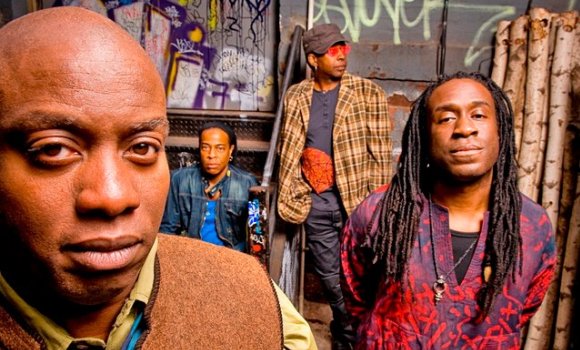news, culture & comment

- This event has passed.
Living Colour at Lincoln Theatre
July 18, 2013 @ 8:00 pm - 10:00 pm

Living Colour is touring this summer to celebrate the 25th anniversary of their debut album Vivid. They will perform at the Lincoln Theatre in Raleigh on Thursday, July 18.
$22 Advance
$25 Day of Show
$32 VIP Balcony
Living Colour in their own words:
The brainchild of Vernon Reid, Living Colour first emerged on downtown Manhattan’s vibrant ‘no-wave’ punk-funk music scene in 1983. Reid, a Brooklyn native (born of Caribbean immigrant parents from Montserrat) and barely out of his teens had quickly established himself there as a fiery and rising guitar star. He had honed his skills playing in avant-funk bands like Joe Bowie’s Defunkt and Ronald Shannon Jackson’s Decoding Society and had toured Europe, Asia and Africa several times, when he decided it was time for him to step out and do his own thing, a more rock and roll oriented thing. The embryonic versions of Living Colour played instrumental music rife with evidence of Reid’s eclectic tastes, experiences and background. The occasional vocal feature found Reid himself shouting and crooning to a sometimes-comic effect, more out of necessity than desire. Due to its hybrid nature, that first edition of L.C. was considered a suitable opening act for groups as disparate as Fishbone, The Art Ensemble of Chicago and John Cale. Living Colour went through two rhythm section changes before arriving at the ensemble whom recorded Vivid, their major label debut on Epic Records in 1988. Reid lost two sets of journeymen band mates to more lucrative gigs with Lisa Lisa and The Cult Jam and Steve Winwood— career transitions, which ironically indicate just how wide of a musical net Living Colour was already casting.
The mid-80s American music business—radio, record labels, MTV included—was not the most inviting place for an African American yearning to parlay his own brand of metal-dusted rock music. It also seemed to Reid, that a de facto policy of discrimination was being enforced in the business—one that treated rock music as a ‘whites-only’ province, one where, with rare exception, artists of African descent were expected to only scuffle in acceptably ‘ethnic’ genres—R&B, rap or reggae—if they wanted to get ahead. Many of Reid’s Black peers who wanted to also play rock decided it was easier, and less of an economic risk, to accept musical apartheid. In 1985 Reid, an anything but passive student of Civil Rights history, invited several associates (who included film producer Konda Mason, record producer Craig Street and musician Geri Allen) to join him in forming the Black Rock Coalition. The BRC’s stated aim was to combat industry racism and become the pro-active advocates of musical liberation they were seeking. A quarter-century later the BRC’s members have come to include the bands Fishbone and Bad Brains, and have become world-renowned for their Black Rock Orchestra which Reid formed and initially directed while Living Colour began building an incendiary rep as one of NYC’s best live rock acts.
The version of Living Colour that assembled Vivid began to take shape in late 1985 when vocalist Corey Glover came into the fold. Glover, a fellow Brooklynite from Reid’s neighborhood, was himself just out of high school then and already pursuing a career as an actor—a calling that would eventually land him a role as an infantryman in Oliver Stone’s 1987 Vietnam war-pic, Platoon. Glover turned out to be the perfect foil for Reid’s mercurial songwriting, which demanded a singer who could approximate the gritty soul shouting of a Wilson Pickett, the eternal infernal howl of a Robert Plant and the buoyant lilt of Caribbean Soca champs like Arrow and The Mighty Sparrow. Glover also brought a much needed crowd- rousing theatricality, Eros and outright machismo to the band’s prior cerebral jazz-rock genius profile. These qualities of Glover’s also brought about a marked increase in the number of women seen attending L.C. shows—surprisingly undaunted by the beer scented halls and scary bathrooms of L.C.’s most beloved and supportive venue, the gone but never to be forgotten, CBGB’s.
…
Asked “Why Living Colour, again, and why now?,” Reid replies that he’s never wanted be in “repertory band”—one looking to make its last hurrah on the nostalgic laurels afforded from songs recorded two decades earlier. “‘For us the band has always been about possibilities, so the challenge was to dig deep and see what might be there for us to say to this historical moment. The rock genre still holds appeal because songs with lyrics allow you to concoct an emotional capsule that can speak to people for years afterwards.”
Leave a Reply
You must be logged in to post a comment.